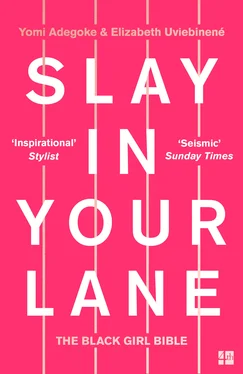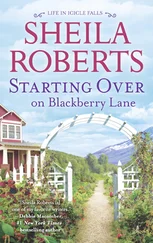1 ...6 7 8 10 11 12 ...17 Sometimes the racism is more subtle and underhand, as Afua Hirsch, a barrister, award-winning journalist and author, experienced at Oxford:
‘People always asked for weed, especially when I was with my friends, especially my male friends. They would just assume that they were local drug dealers. And it was always those really posh boys. In their brain, the only function of black men is to buy drugs from. That was one of the most infuriating and offensive things. Or you’d arrive at a party and they’d just assume that you were the local dealers showing up to supply. I hated that, I really hated that.’
A more ‘in-your-black-face’ form of racism is, well, black face. It was a costume staple at parties when I was a student, but at Cardiff University it actually made its way into a play written by medical students in 2016. A student actor blacked up and wore an oversized dildo to make fun of a black lecturer at the university, which unsurprisingly caused a feeling of ‘segregation’ between groups of different ethnic backgrounds. 14Eight students of African heritage complained, and this, according to the independent report commissioned by the university as a result of the incident, led to a ‘major backlash’. Some of the complainants were told by their fellow students they were being ‘very and unduly sensitive’ and that they should accept it as ‘tradition’, as the play was an annual occurrence. The students who had raised the objections felt they had been ‘ostracised’ and some decided to leave Cardiff.
Three years before, a couple of hundred miles away in York, four male students donned black face, too. 15They were depicting the Jamaican bobsled team from the film Cool Runnings . Over in Edinburgh, law students painted their faces to dress as Somali pirates for an ‘around the world’ themed party. 16Meanwhile, at the University of London, a student was actually rewarded with a bottle of wine for their racial insensitivity when they won a fancy dress competition at a union event by donning black face. 17And in Loughborough last year, students organising freshers’ events had to issue an apology after planning a ‘slave auction’ and ‘slave night’ as part of the entertainment for the university’s new intake. 18It is important to note that this kind of flippant racism is as common among those educated in the most elite of institutions as it is anywhere else. These are not isolated incidents but part of the very foundation of British society. They are being perpetrated by the bankers, lawyers and doctors of tomorrow: people who will become the managers who throw out CVs because they can’t be bothered to pronounce ‘Akua’.
A recent report 19by race-equality think-tank the Runnymede Trust highlighted the feelings of exclusion and rejection felt by many black university students as they navigate alienating curricula, come up against lower expectations from professors, and experience brazen racism on campus. The report emphasised the importance of universities becoming ‘actively anti-racist institutions’ – something that, as bastions of ‘progressive thought’ and ‘talented minds’, shouldn’t be such a big ask.
But very few universities have taken appropriate measures to prevent or punish racism, and students are often forced to take matters into their own hands. It was racist incidents such as those outlined above that led to the creation in 2013 of the Anti-Racism Society at my old university, run voluntarily by a group of undergraduates. It offers students advice or someone to talk to about race-related issues, and puts on events such as sleepovers, movie nights and panels offering often cathartic discussions about race and racism. Many students feel more comfortable reporting incidents to their peers, as opposed to their institution’s reporting systems, but those who run societies like this are under the same pressures – in terms of racial tensions and university work – as those who come to them for help. The frequency of racial abuse on campus is something that universities, not students, should handle better, but even so, these spaces, groups and organisations are important. Anti-racist societies are different to an African-Caribbean Society, where the basis of meetings isn’t always necessarily political; these societies exist specifically for tackling racism. Don’t be afraid to be the person to create that space at your university if it doesn’t already exist.
Sometimes the microaggressions can occur at the hands of the universities themselves. Femi Nylander was a recent graduate of Oxford when he found himself racially profiled. He was visiting a friend’s office in Harris Manchester College and was locked out, so he went to the office’s kitchen to do some writing, chatted briefly with staff and students he knew and then left. Later that day, a CCTV image of Nylander walking around the college was emailed to all of its staff and students, along with a message warning them to ‘be vigilant’ and to ‘alert a member of staff […] or call Oxford security services’ if they saw him. His presence, it warned them, was a reminder that the college’s ‘wonderful and safe environment’ can be taken advantage of, adding that its security officers ‘do not know [his] intentions’. No one once asked Femi who he was or why he was there.
Afua remembers her visitors also being on the receiving end of similarly racist treatment at Oxford years before:
‘I had this boyfriend in London who was black and I coped by running away a lot on the weekends and hanging out with him, and then he’d come and visit me and that was a big issue because he was a dark-skinned black man. One time when he came to my college, they wouldn’t let him in and the porter rang me and said: “You should’ve warned us if you were expecting someone who looked like a criminal,” and I’ll never forget that. Even then, I was like, I cannot believe I’m having to put up with this. It was like there was no sense that … It was really bad and I was very conscious of being with him at Oxford because it kind of drew further attention to me as a black woman.’
These types of everyday microaggressions have sparked several conversations and motivated various campaigns, one of the most high-profile being the ‘I, too, am Oxford’ series, inspired by the ‘I, too, am Harvard’ initiative in America. In 2014, Oxford students organised a photoshoot consisting of 65 portraits of BAME attendees of the university, with the hopes of highlighting the ignorance they came across at Oxford – and confronting it. ‘How did you get into Oxford? Jamaicans don’t study’, ‘But wait, where are you really from?’ and ‘I was pleasantly surprised … you actually speak well!’ were just some of the choice quotes written on the placards they held in front of them, forcing their peers to encounter the ugly face of university racism. It is hugely important that black students continue to have these conversations and to hold their universities to account, especially when white students so often centre racial discourse around themselves. During Afua’s time at university, even the ACS wasn’t a black safe space:
‘I joined the African-Caribbean Society only to discover that it was run by a white boy from one of the elite private schools in the country because he loved going to Jamaica to his dad’s villa in the summer holidays and he had fancied being a “DJ reggae man”. At the time, I was just like, this is completely off, but I couldn’t articulate it. It was classic white privilege, exoticisation.’
Perhaps as a result of the slowly increasing black student population, the voice of black students is beginning to be heard in universities in a way it hasn’t been before, as Afua explains:
‘For my book, I interviewed some black female students and it was interesting listening to them, because on one level they were describing the same microaggressions that we experienced, i.e. getting IDd when you were going to different colleges whereas white people weren’t, or porters confusing you with the one other black person in the college even though you looked nothing alike, that kind of thing. But their attitudes were so different: they had names for it. We didn’t have a word for microaggression and they had a confidence and ability to articulate their sense of oppression that I really admired. Even though on one level it was an acknowledgement that a lot of things hadn’t changed, I found it really positive and uplifting speaking to these students because they were much more organised and assertive and they called things out when they saw them, whereas we just didn’t feel able to. We would talk about it amongst ourselves but we just kind of had a defeatism about it.’
Читать дальше












